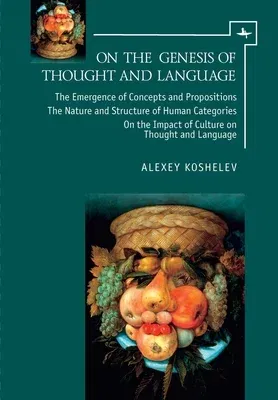In On the Genesis of Thought and Language, linguist Alexey Koshelev
explores fundamental questions of how human concepts arise in a child,
why concepts appear in a child before words, the genesis of language,
and why there are so many languages. Chapter One introduces the
fundamental dichotomy "visual (exogenous) vs. functional (endogenous)"
cognitive units; these units are used to give non-verbal definitions of
mental representations of various objects, actions, and situations. In
particular, definitions of such concepts as GLASS, CHAIR, BANANA, TREE,
LAKE, RUN, and some others are given. Chapter Two discusses how children
form concepts, hierarchical relationships, and propositions (conceptual
'utterances'). It is shown that the initial units of the child's
representation of the world are pre-conceptual cognitive units--mental
representations of whole situations. In the course of two consecutive
cycles in the child's cognitive development, these units transform into
(a) primary notions--object and motor concepts, and (b) binary role
relationships. Together, they constitute the elementary language of
thought which, in the process of thinking, is used to build conceptual
structures--propositions. It is further demonstrated that, immediately
after the formation of thought, the child begins to develop his native
language in which concrete and motor concepts become initial meanings of
nouns and verbs, while propositions become the meanings of the child's
expressions. The chapter concludes with a contrastive analysis of the
proposed approach and Aristotle's and Chomsky's views on thought and
language. Chapter Three analyzes how a community's culture affects its
language. It is demonstrated that the progress of a community, the main
constituent of the civilizational component of its culture, enhances the
development of the content component of language by extending the range
of its lexical and grammatical meanings. In the context of this
analysis, Daniel Everett's (2008) hypothesis that culture affects
language structure is discussed. In the subsequent sections, models of
the development of human and social activity are offered. These models
comprise three components: Activity (main component), Thought, and
Language (auxiliary components that ensure the successful realization of
activities). The models are illustrated with examples of some concrete
societies.

